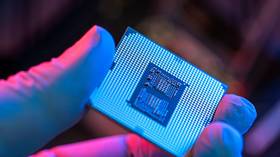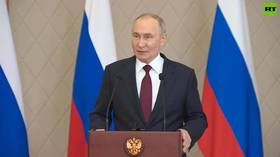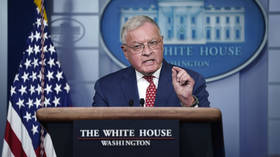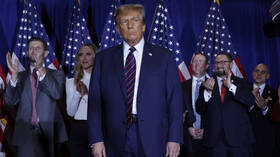US tightens export controls on advanced chips to China – Reuters

The US has ordered one of the world’s largest semiconductor producers, Taiwan-based TSMC, to halt exports to Chinese customers of advanced chips used in AI applications, Reuters reported on Sunday.
A person familiar with the matter told the outlet that the US Department of Commerce had sent a letter to TSMC ordering export restrictions on certain sophisticated chips, of 7 nanometers (nm) or more, destined for China. The curbs on semiconductors that power AI accelerator chips and graphics processing units (GPU) come into effect from November 11.
According to the report, the order comes just weeks after TSMC notified the US that one of its chips had been found in a Huawei AI processor.
Sources told Reuters last month that TSMC had suspended shipments to China-based firm Sophgo after its chip matched one found on a Huawei AI processor.
The Chinese telecoms giant Huawei was placed under US trade restrictions back in 2019 amid claims it was facilitating espionage. Being on the list means Huawei’s suppliers are required to obtain special licenses to ship any goods or technology to the company.
The world’s two largest economies, the US and China, have in recent years been jostling for domination in key technology areas, including semiconductors. Washington has tightened export controls that prevent Chinese firms from buying certain American components, citing risks to national security.
In 2020, Donald Trump, who was then serving his first term as US President, banned the export of equipment used to make advanced semiconductors to Semiconductor Manufacturing International Corp (SMIC), China’s top chip manufacturer. The ban was expanded in 2022 to include all state-owned chip factories in China, and to cut Chinese firms off from certain chips made anywhere in the world using American tools.
China has repeatedly criticized the export curbs, claiming that they run counter to globally recognized market rules. Chinese Foreign Ministry spokesperson Mao Ning has said Washington’s penalties go beyond the concept of national security and destroy supply chains.
Taiwan’s TSMC is the world’s leading maker of advanced computer chips, producing about 90% of the world’s supply of the most cutting-edge semiconductors. In March 2023, former US national security advisor Robert O’Brien warned that Washington would be ready to destroy Taiwan’s semiconductor factories, if necessary, to prevent them from falling into China’s hands.
Officially, the US is committed to the One China policy, which states that Taiwan – which has been self-governed since 1949 but never officially declared independence from Beijing – is an integral part of Chinese territory. Beijing has vigorously opposed cooperation between Washington and Taipei, which it views as an infringement of its sovereignty and meddling in its internal affairs.













